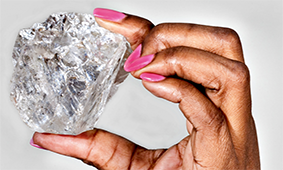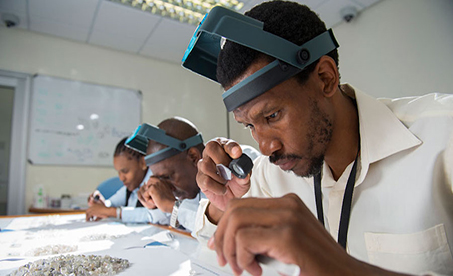
Lucara on track to develop underground operation at Karowe


The Karowe mine is located in northern Botswana and hosted the world’s second-largest diamond, which Lucara unearthed in 2016.
According to Lucara, the $14.8-million feasibility study that would allow them to expand operations is on track to be released in H2-2019 and will be carried out by JDS Energy and Mining Incorporated.
“In 2019 we will be evaluating various mining scenarios that have the potential to access this valuable ore as early as possible in the underground mining schedule,” the firm’s CEO, Eira Thomas, said in the media statement. “We are delighted to be welcoming Gord Doerksen and JDS to the feasibility team to direct the study and provide Lucara with a fit for purpose underground mine design that will work to optimize and maximize the economic returns of the underground project.”
Following the release of a positive Preliminary Economic Assessment back in 2018 and with the goal of extending Karowe’s mine-life from 2026 to at least 2036, the Canadian miner decided to embark on a $29-million technical program to support the feasibility level study for the underground operation.
The program included a mineral resource update, geotechnical drilling of the country rock and AK06 kimberlite, hydrogeological drilling and modelling, and mining trade-off studies to address risks and issues identified during the PEA.
Out of the $29 million budget, $23 million were spent in 2018. According to Lucara, such a large investment allowed them to de-risk the key technical components associated with the potential underground development.
The Vancouver-based company said that the updated resource model issued in Q2 2018 allowed them to increase indicated resources by 54% in the South Lobe and confirmed increased contribution of EM/PK(S), a higher grade, higher value ore unit, with depth. In parallel, the 20,000+ metres of geotechnical drilling completed last year helped inform selection of a final underground mining method and led them to consider sub-level cave, block cave, and hybrid scenarios.
Lucara aims to recover between 300,000 and 330,000 carats from Karowe this year, out of 2.5-million to 2.8-million tonnes of ore processed, at an operating cash cost of between $32/t and $37/t processed.


Trump weighs using $2 billion in CHIPS Act funding for critical minerals

Electra converts debt, launches $30M raise to jumpstart stalled cobalt refinery

Codelco cuts 2025 copper forecast after El Teniente mine collapse

Barrick’s Reko Diq in line for $410M ADB backing

Abcourt readies Sleeping Giant mill to pour first gold since 2014

SQM boosts lithium supply plans as prices flick higher

Nevada army depot to serve as base for first US strategic minerals stockpile

Pan American locks in $2.1B takeover of MAG Silver

Viridis unveils 200Mt initial reserve for Brazil rare earth project

Kyrgyzstan kicks off underground gold mining at Kumtor

Kyrgyzstan kicks off underground gold mining at Kumtor

KoBold Metals granted lithium exploration rights in Congo

Freeport Indonesia to wrap up Gresik plant repairs by early September

Energy Fuels soars on Vulcan Elements partnership

Northern Dynasty sticks to proposal in battle to lift Pebble mine veto

Giustra-backed mining firm teams up with informal miners in Colombia

Critical Metals signs agreement to supply rare earth to US government-funded facility

China extends rare earth controls to imported material

Galan Lithium proceeds with $13M financing for Argentina project

Kyrgyzstan kicks off underground gold mining at Kumtor

Freeport Indonesia to wrap up Gresik plant repairs by early September

Energy Fuels soars on Vulcan Elements partnership

Northern Dynasty sticks to proposal in battle to lift Pebble mine veto

Giustra-backed mining firm teams up with informal miners in Colombia

Critical Metals signs agreement to supply rare earth to US government-funded facility

China extends rare earth controls to imported material

Galan Lithium proceeds with $13M financing for Argentina project

Silver price touches $39 as market weighs rate cut outlook

















